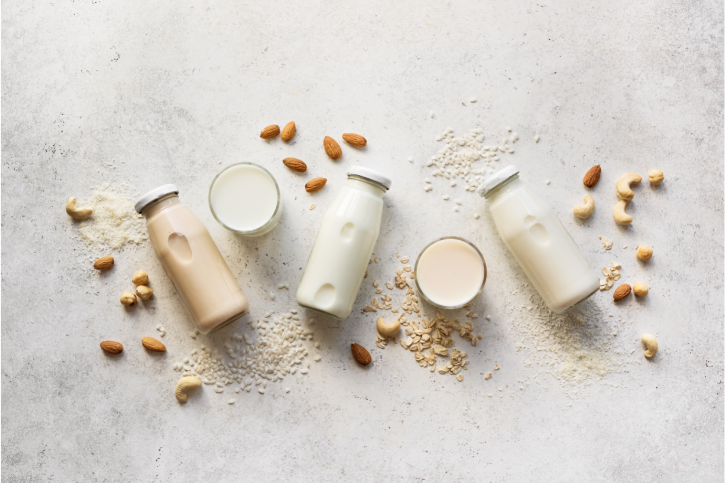
September 13, 2022 2 min read
There are many plant-based milks that can be substituted for cow's milk. Most plant-based milk alternatives contain less protein than cow's milk, with the exception of Soy milk. Soy milk is the closest to cow's milk in terms of nutrients. It contains polyunsaturated and monounsaturated fats, which are the healthiest kind of fats.
Cows milk contains many nutrients and is very high in calcium in protein, but it also contains high amounts of saturated fats.
Dairy products contain significant amounts of saturated fats, which raise cholesterol and can increase your risk of heart disease.
Skim milk has been processed to remove any fat but contains the same nutrients as whole milk. However, not all fat is bad for you, and some plant-based milks are rich in these healthy unsaturated fats.
Check out Healthy Fats – Polyunsaturated & Monounsaturated Fats to learn more about different types of fat.

Oat Milk
Oat milk is high in protein. It has more protein in it than most other plant-based milks. It is also high in calcium, fiber, and vitamin B.
It can be used in place of cow's milk for anything, making it a great option for those who are lactose intolerant or have a dairy allergy.
Those with nut allergies have fewer options for non-dairy milk, so oat milk is a good option for them as well. Nut milks such as almond milk and cashew milk are also popular alternatives to cow’s milk, although they can sometimes have added sugars.
Hemp Milk

Hemp milk is rich in healthy fats and protein. It contains omega-3 and omega-6 fatty acids, which help with brain function and focus. it sometimes contains other ingredients for added flavor or for a sweeter taste.
Like cow's milk, hemp milk is rich in calcium which is good for bone health and blood circulation. It also lowers cholesterol and triglycerides and helps prevent heart disease.
It is rich in many vitamins and minerals, namely vitamin D and B12, as well as magnesium, iron, and zinc. Hemp milk also controls inflammation in the body.
All of these plant-based milks can be made at home with our organic ingredients. Check out our recipe for how to make Oat Milk in three easy steps!
❤ Try our USDA certified Regular Rolled Oats, Hemp Seeds, and Soybeans ❤
Related Blogs:
Thanks for reading this Be Still Farms Blog article. To sign up for more news/articles and/or recipes, click here. For more about us, click here. To shop our certified organic products, click here.
Please comment and share and we look forward to serving you in the future!
Comments will be approved before showing up.

January 27, 2025 3 min read
Flaxseed, the tiny yet powerful superfood, is packed with nutrients that can support weight loss. From curbing hunger to stabilizing blood sugar, this guide dives into the science of how flaxseed can help you shed those extra pounds.

December 11, 2024 3 min read
Discover three quick and easy soup recipes featuring organic small red beans. From a classic vegetable soup to a creamy potato blend, these wholesome recipes are perfect for chilly days and busy weeknights. Packed with flavor and nutrition, these soups will warm your heart and soul this winter!

December 06, 2024 3 min read
This vibrant and nutritious Green Lentil Salad combines tender lentils with grilled chicken, fresh vegetables, and a zesty lemon dressing. Packed with protein, fiber, and essential vitamins, it’s the perfect healthy meal for any time of day.
© 2026 Be Still Farms- Real, Fine Organics.
Privacy | Terms | Refund Policy | Organic Certification
